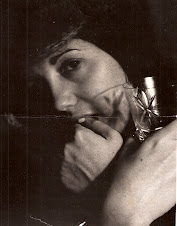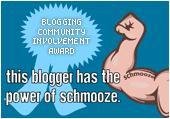On my return home from my walk i saw a huge bird circling above me; on closer scrutiny i could see that it was a bald eagle, although i could only discern a very small area of white on its head. That, and the speckled feathers indicated that it was obviously a "teenager". Wild with excitement, i stopped and stared and looked around to see it there was anyone around to share this wonderful sight with. A young boy saw me looking, and stopped, i turned to him as he was preparing to cross the road, and pointing skyward, said to him: "A bald-eagle, a teenage bald eagle!!". He replied: "oh wow, I have never seen one before". So together we stood, looking up in awe at the magnificent young bird.
As the wild creature flew eastward i said: "It's symbolic you know, of..." and as i searched for the right word he said: "Flight, being able to take flight". I said: "Yes! that's exactly it." We smiled at each other, then both continued on our separate way, united only in that brief yet joyous moment in time, each taking with us a Perfect Gift of Knowing.
Thursday, February 09, 2006
Sunday, February 05, 2006

Watercolour 22" x 22" I Hide Myself Within My Flower by Zen Chuang, a physician painter whose medical practice and artwork seek to "paint our days with colours, fill our lives with beauty!" www.FromEarthToSky.com
pp. 94-95 "Friendship: A Vessel of Soul-making
In the practice of friendship, we might keep this important aspect of soul in mind: its need for containment. [my highlighting] Our capacity to keep a secret could be important to a friend who may feel free to talk to us in a spirit of confidentiality. It often happens, too, that what goes on among certain friends has to be protected from other friendships. Emily Dikinson's biographer Richard Sewall notes that Emily made a separate world of her various correspondents and friends: 'The letters to Higginson say nothing about Bowles, the letters to Bowles say nothing about Higginson; the letters to Helen Hunt Jackson say nothing about either of them.'
A friend could also offer containment by receiving another's feelings and thoughts without a strong need for interpretation or commentary. Sometimes, of course, we ask friends to offer their opinions and judgments, but even then we expect a high degree of acceptance and recognition of who we are. In friendship, we want to receive and to be received.
In the years of my work as a therapist, many people asked me to be their friend rather than their therapist. 'Couldn't we just meet at a coffee shop,' they would say, or, 'If you talked to me about yourself, this conversation wouldn't be so one-sided.' Clearly there is a difference between being a friend and being a therapist, the latter role lacking the mutuality of friendship. I have come to understand this common distaste for the therapeutic role and the desire for friendship as the soul asking for what it know is best. To the soul, there is hardly anything more healing than friendship. I suspect that a patient's wish for friendship with a therapist is more a correct intuition than a defense." [my highlighting]
- Thomas Moore - Soul Mates: Honoring the Mysteries of Love and Relationship
In the practice of friendship, we might keep this important aspect of soul in mind: its need for containment. [my highlighting] Our capacity to keep a secret could be important to a friend who may feel free to talk to us in a spirit of confidentiality. It often happens, too, that what goes on among certain friends has to be protected from other friendships. Emily Dikinson's biographer Richard Sewall notes that Emily made a separate world of her various correspondents and friends: 'The letters to Higginson say nothing about Bowles, the letters to Bowles say nothing about Higginson; the letters to Helen Hunt Jackson say nothing about either of them.'
A friend could also offer containment by receiving another's feelings and thoughts without a strong need for interpretation or commentary. Sometimes, of course, we ask friends to offer their opinions and judgments, but even then we expect a high degree of acceptance and recognition of who we are. In friendship, we want to receive and to be received.
In the years of my work as a therapist, many people asked me to be their friend rather than their therapist. 'Couldn't we just meet at a coffee shop,' they would say, or, 'If you talked to me about yourself, this conversation wouldn't be so one-sided.' Clearly there is a difference between being a friend and being a therapist, the latter role lacking the mutuality of friendship. I have come to understand this common distaste for the therapeutic role and the desire for friendship as the soul asking for what it know is best. To the soul, there is hardly anything more healing than friendship. I suspect that a patient's wish for friendship with a therapist is more a correct intuition than a defense." [my highlighting]
- Thomas Moore - Soul Mates: Honoring the Mysteries of Love and Relationship
Subscribe to:
Comments (Atom)





